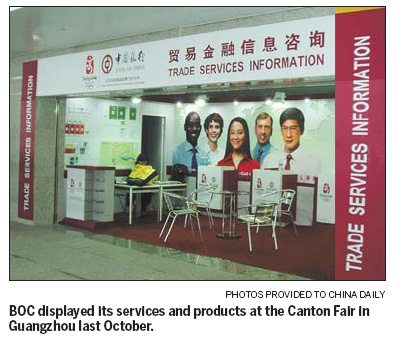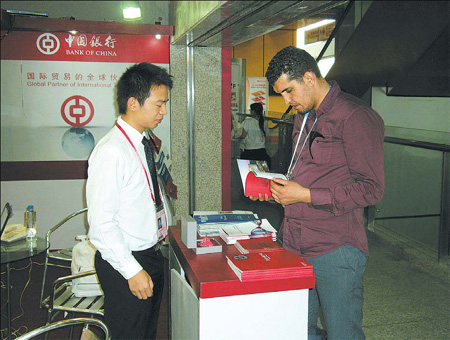BOC currency settlement now tops world
|
|
|
Bank staff member outlines BOC's international financial services to a potential foreign client. [China Daily] |
Chinese banks, especially highly internationalized operations like Bank of China (BOC), are playing an increasingly important role in overseas expansion by domestic companies.
An example is a trade financing plan from BOC that played a crucial role in the takeover of Canadian Royalties Inc on Dec 31 last year by Jilin-based Jien Nickel Industry Co Ltd.
Jien Nickel acquired the remaining common shares of the North American miner at 78 cents apiece, finishing the final takeover, but the deal was at an impasse until BOC provided a $175.3 million line of credit.
Canadian Royalties will now de-list from the Toronto exchange and become the raw material supplier for Jien Nickel.
The deal was finally closed after BOC's Toronto branch offered acquisition consultation and credit to Jien Nickel as the bidding continued and prices increased due to a surge in the market.
Jien Nickel's acquisition was a bit unusual in last year's sluggish economy as China's import and export business registered its worst performance since 2000.
But the crisis offered opportunities for some. BOC itself saw robust growth in international business due to its strengths in international clearing and trade financing.
Statistics show that BOC's international settlement business totaled $1.43 trillion last year, ranking the bank first worldwide.
Its domestic institutions contributed $640 billion to the total, beating the overall performance of China's export business last year and accounting for 30 percent of the market.
Full services
As more Chinese enterprises plan to go overseas, they need a comprehensive set of financial services rather than a single product, according to industry experts.
As the most internationalized commercial bank in China, BOC is well positioned to benefit from the growing trend.
With nearly 10,000 outlets and more than 900 overseas branches, including subsidiaries and representative offices, in 31 countries and regions, the bank often serves Chinese enterprises in overseas expansion.
According to PricewaterhouseCoopers LLP (PwC), Chinese companies might increase overseas mergers and acquisitions (M&As) by 40 percent next year while total outbound deals may hit a record high of $30 to $35 billion this year.
With the global financial crisis making overseas assets more attractive, the value of Chinese companies' announced outbound M&A deals might triple this year over 2008, said the report.
The major risk for Chinese companies in fostering overseas M&As is insufficient risk analysis capabilities, particularly in financial aspects, said Wang Xiaogang, a partner at PwC China.
To meet the need, BOC now offers a set of customer-tailored products and services, including project financing, overseas cash management, supply chain financing and foreign exchange management.
At the initial stage of an M&A, the bank will participate in negotiations between parties, designing a financing plan and providing capital support.
During actual operations, BOC helps companies hedge against risks in interest rates, foreign exchange and exposure.
When the second-largest US electronic products retailer Circuit City went bankrupt in 2008, two Chinese suppliers didn't suffer large losses because their accounts were managed by BOC.
As Circuit City's business worsened, the US banks issued a risk warning and BOC suggested the Chinese suppliers change their sales strategy. One stopped sales to Circuit City and the other issued a letter of credit.
They received all funds due them with the help of BOC "international factoring", which assists in payment based on bills of lading and receivables.
During the global financial crisis, increasing numbers of Chinese companies realized the importance of trade factoring to hedge risks when exploring overseas markets.
In 2009, BOC's international factoring exceeded $10 billion, among which export factoring was more than $2 billion, the most by any bank worldwide.
Renminbi payment

BOC also achieved a breakthrough in cross-border renminbi settlement. After China's State Council announced plans in December 2008 to begin renminbi settlement trials in some overseas economies, BOC concluded more than 300 cross-border settlement deals with a combined value surpassing 6 billion yuan.
The bank has also deepened cooperation with international financial institutions and developed new products. It worked with the Asian Development Bank last year on trade financing to produce the bank's first deal in the sector.
Statistics show that in 2009, the BOC's domestic institutions realized a rapid increase in both renminbi-denominated and foreign currency trade financing.
Foreign currency trade financing jumped by 60 percent year-on-year, while its renminbi-denominated trade business soared 85 percent.
 0
0 







